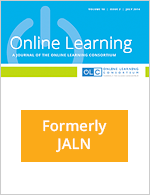Assessment of Individual Student Performance in Online Team Projects
The use of team projects has been shown to be beneficial in higher education. There is also general agreement that team efforts should be assessed and that the grading ought to represent both (1) the quality of the product developed jointly by the team, as well as (2) the degree of participation and quality of contribution by each individual student involved in the group process. The latter grading requirement has posed a challenge to faculty, so the question addressed in this paper is, “How should individual team members in online courses be assessed for the extent and quality of their contributions to the group project?” To answer this question, four common team member evaluation practices were reviewed and compared to seven criteria representing positive attributes of an assessment practice in an online learning environment. Whereas the Peer Assessment practice received the greatest support in the literature in face-to-face courses, this study considered the perceptions of graduate faculty and students and recommended the Faculty Review practice as the default assessment practice in online courses because of its overall cost-effectiveness in this learning environment.

